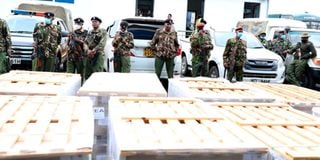Premium
IEBC’s ‘storm tamer’ hits yet another one

Police officers guard the first batch of ballot papers which were received by IEBC at JKIA on July 7, 2022.
It is testimony to Mr Wafula Chebukati’s resilience that he survived the Supreme Court’s annulment of the 2017 presidential election results, to preside over another vote five years later.
Knowing well the turbulent times he has faced since appointment as chair of the Independent Electoral and Boundaries Commission just seven months before the last General Election, it should be second nature for him to always do everything possible to address the incessant questions and demands of election candidates.
Apart from competence and efficiency, the job demands that those running elections not only be fiercely independent and transparent, but be seen as such.
Under ordinary circumstances, the election management body would have earned plaudits for seeing to delivery of ballot papers from their overseas printers in good time ahead of the elections slated for August 9.
Delivery yesterday of the first batch of ballot papers would indicate a high degree of efficiency and go a long way to earning the IEBC public trust in its capacity to deliver a flawless election. However in an atmosphere where mistrust reigns, Mr Chebukati, instead of cheers, faced a barrage of questions that are still crying out for answers. The big questions revolved around the little notice given that the consignment of ballot papers from the printers in Athens, Greece, was landing at Jomo Kenyatta International Airport.
Printed papers
The printed papers arrived even before a gazette notice had been published listing the names of all candidates cleared to contest in the elections for Members of County Assembly, Governors, Members of National Assembly, Senate and President.
If the printers were given the list before it had been published in the official Kenya Gazette, it means the printing was done before there was legal list of candidates.
That by itself raises questions as to what would happen if for one reason or other, the lists have to be amended given that some of the nominations are still being fought out in court.
Mr Chebukati might in his wisdom have intended to dispense with the printing early so that pending legal challenges are overtaken by events; but the courts might take a dim view of such a ruse given printing should follow the gazette notice, not the other way round.
Also a serious issue is that the move might serve to feed the suspicious minds of election candidates and the usual conspiracy theorists. Even before the ballot papers arrived, some of the major political formations were asking hard questions about integrity of the supply of ballot papers and other elections materials; as well as recurrent questions about the entire electoral system, particularly the voters registers, the vote count and the tallying and transmission of results.
Met presidential candidates
Mr Chebukati, to his credit, bent over backwards to assuage the fears of stakeholders. He met the presidential candidates, responded to their queries and assured them that everything would be above board.
He even pledged to facilitate visits to Athens by representatives of the presidential candidates so that they could witness the printing for themselves, monitor the packaging and even escort the bundles to Nairobi.
If indeed Mr Chebukati does not keep to his end of the bargain, political players will not only feel cheated, but have even more room to complain about lack of transparency and the possibility of something fishy taking place.
The commission has already been facing queries over its competence and impartiality. The two main presidential candidates — Deputy President William Ruto of the Kenya Kwanza alliance and former Prime Minister Raila Odinga of Azimio la Umoja coalition — have tabled their respective lists of questions, demands and accusations that the commission is still responding to.
Eyebrows raised afresh over the surprise arrival of ballot papers only puts Mr Chebukati and the commission under more scrutiny on issues of transparency.





